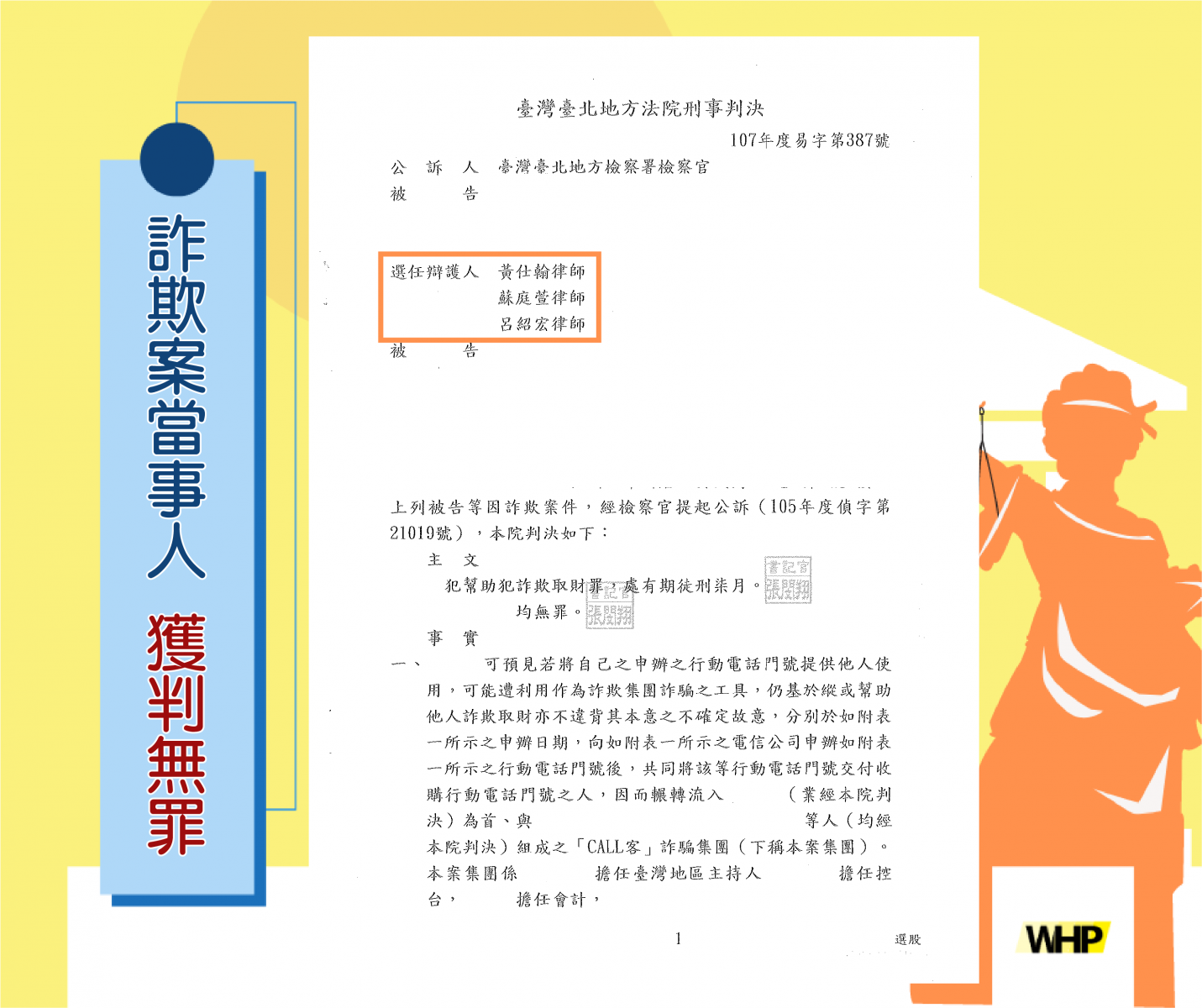首頁 >
| Fraud | Fraud Defendant Acquitted

Relevant Legal Provisions
Criminal Code Article 339, Paragraph 1: Those who, with the intent to unlawfully obtain property for themselves or a third party, use deceit to cause another person to deliver property belonging to themselves or a third party shall be punished with imprisonment for up to five years, detention, or a fine of up to NT$500,000, or both.
Facts and Reasons
In the year 104 of the Republic of China, several defendants, motivated by an intent to unlawfully gain possession of property for themselves, contacted each other and formed a fraudulent group. The group's structure included roles such as leader, controller, accountant, and runner. One of the defendants, who acted as the accountant (the current defendant in this case), was initially invited by an old friend to take on the role of accountant at the company. Since the work could be done from home, and the defendant did not know any other members of the organization, nor was the defendant aware that the company's business practices involved fraud, they were later arrested as part of the fraud group when it was uncovered by the police.
Judgment
According to the testimony, the defendant’s duties involved calculating and transferring payments to designated accounts as instructed. The defendant had no direct contact with the victims or the runners. While the defendant was aware of some personnel involved in the company's operations, the defendant was not directly informed that the operations involved fraudulent activities. Furthermore, the defendant had no contact with the runners, so it was unlikely that the defendant could have known that the funds they were accounting for were involved in fraudulent activities.
All other evidence, including conversations obtained through wiretaps and seized accounting records, salary envelopes, and remittance data, only confirm that the defendant objectively served as an accountant for the group, but there was insufficient evidence to conclude that the defendant had subjective knowledge of the fraudulent activities.
In conclusion, the evidence presented by the public prosecutor has not reached the level of certainty where an ordinary person would be convinced of its truth, and it cannot establish the guilt of the defendant in the joint fraudulent activity with two or more people. Furthermore, there is no other conclusive evidence to prove the charges brought by the public prosecutor. Based on the above explanation, the defendant cannot be proven guilty, and the judgment should be acquittal.
(Note: To protect the client's interests, certain case details and judgment images have been redacted and modified. For a full review of the case, please refer to Judicial Yuan's judgment database)
Attorneys:Vincent Huang、Hsuan Su、Herman Lyu
-
11.25 2025
Criminal | Forgery of Documents, etc. Successfully...
-
11.18 2025
Civil Case | Defendant’s Claim for Damages Success...
-
11.11 2025
Criminal | Violation of Anti-Money Laundering Act,...
-
10.28 2025
Criminal Case | Defendant Acquitted of Hit-and-Run...
-
10.21 2025
Criminal Case | Defendant Charged with Forgery Acq...
-
10.14 2025
Assisted in the Division of Co-owned Property and ...
-
09.30 2025
Defendant – Offenses Against Sexual Autonomy Appea...
-
09.23 2025
Criminal | Defendant Charged with Embezzlement in ...
-
09.16 2025
Criminal | Case of Infringement of Sexual Privacy ...
-
09.09 2025
Request for Ownership Transfer Registration – Plai...
-
09.02 2025
Civil | Joint Construction Dispute Requesting Perf...
-
08.26 2025
Criminal | Defendant Charged with Aggravated Fraud...
-
08.19 2025
Internal Company Dispute Defendant Forged Document...
-
08.12 2025
Civil Case | Check Dishonored – Claim for Loan Rep...
-
08.05 2025
Heavy Motorcycle Rear-End Collision, Lawsuit for N...